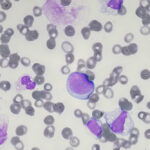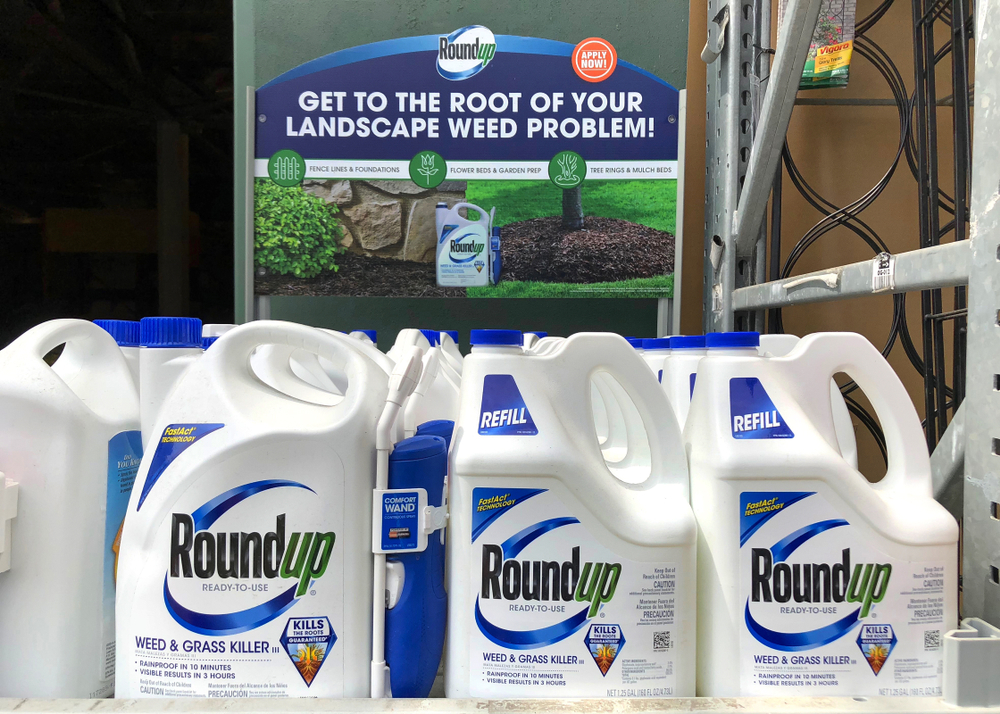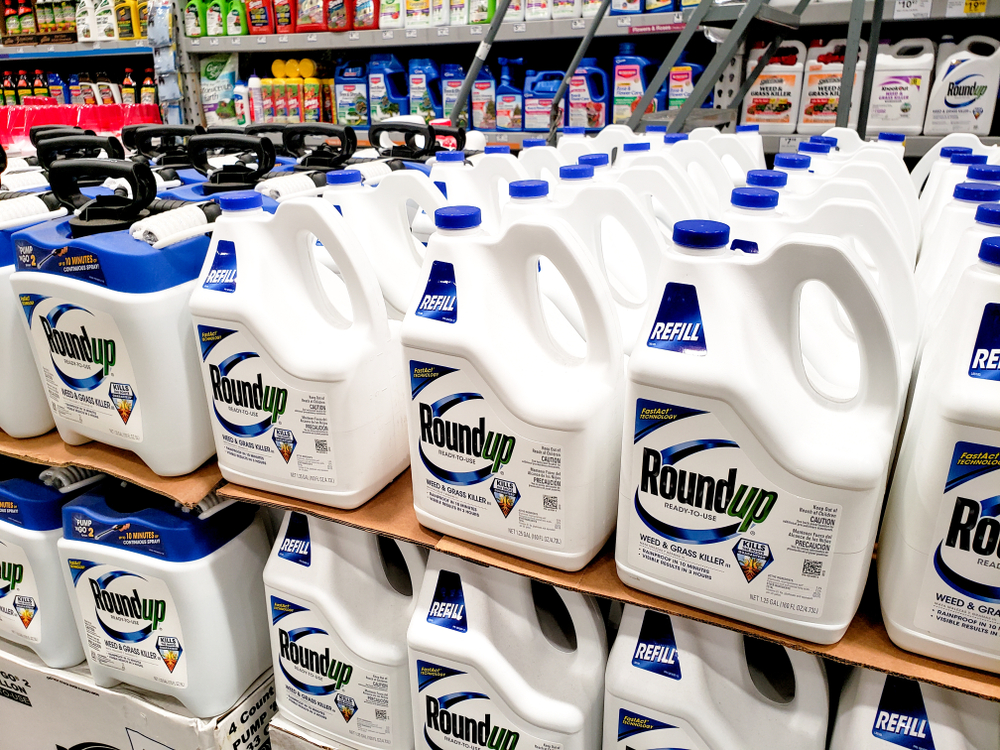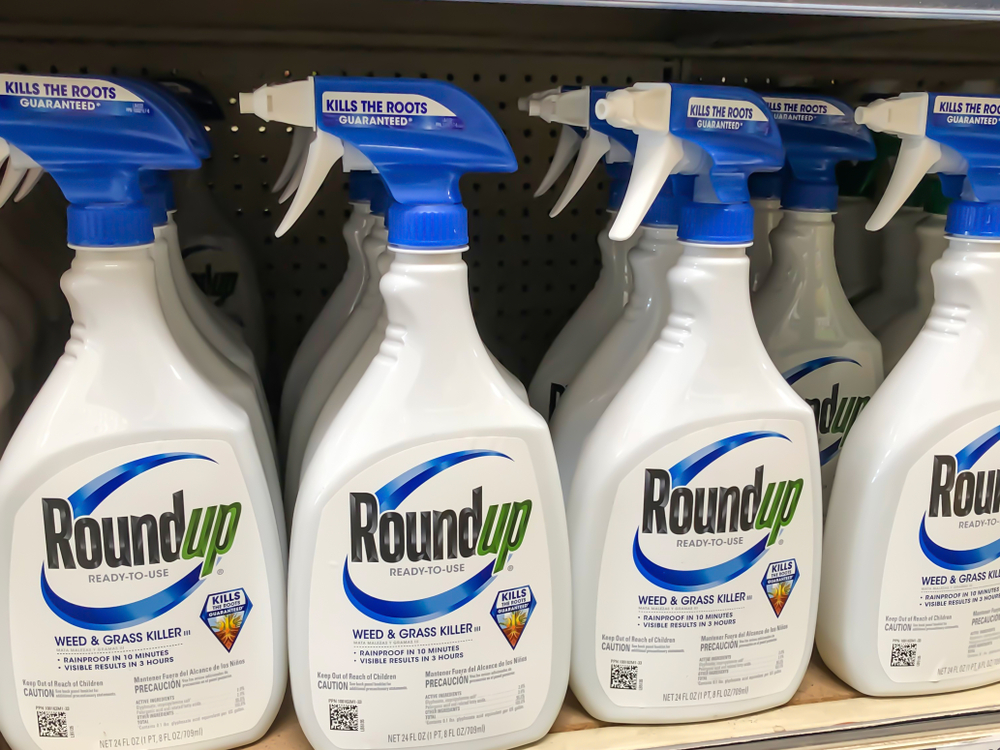Roundup Lawsuits
About Roundup Lawsuits
- Monsanto started selling Roundup, a glyphosate-based weed killer, in 1974. Bayer acquired Monsanto in 2018.
- Glyphosate, the active ingredient in Roundup, has been classified as a probable carcinogen by the World Health Organization (WHO). Exposure to glyphosate in Roundup has been linked to an increased risk of developing non-Hodgkin’s lymphoma and other cancers.
- Thousands of individuals who have been heavily exposed to Roundup are filing lawsuits claiming that their Roundup exposure caused them to develop cancer and that the manufacturer didn’t warn them about the risks. Eligibility for filing a Roundup lawsuit depends on factors such as your diagnosis date, the extent of exposure, and your state’s statute of limitations. A law firm specializing in Roundup lawsuits can assess your case and help you file a claim.
Roundup Lawsuits FAQs
Is it safe to use Roundup?
Glyphosate, the active ingredient in Roundup, has been classified as a probable carcinogen by the World Health Organization (WHO). While the U.S. Environmental Protection Agency (EPA) has deemed it safe, there are concerns and ongoing legal disputes regarding its safety, especially its potential link to cancer.
Why are Roundup lawsuits being filed?
Roundup lawsuits are being filed by individuals who claim that exposure to glyphosate, the key ingredient in Roundup, caused them to develop cancer, particularly non-Hodgkin’s lymphoma. They allege that Monsanto, the maker of Roundup (now owned by Bayer), did not adequately warn the public about these cancer risks and may have hidden evidence.
Can I still file a Roundup lawsuit?
If you’ve been exposed to Roundup and believe it led to cancer, you may still be eligible to file a lawsuit. Eligibility depends on factors such as your diagnosis date, the extent of exposure, and your state’s statute of limitations.
Is Roundup still being sold?
Bayer stopped selling glyphosate-based Roundup products for residential use in the U.S. as of January 2023. It is still sold for commercial and agricultural purposes. Glyphosate, the active ingredient in Roundup, remains available for these applications.
Does glyphosate cause cancer?
Glyphosate, the active ingredient in Roundup, was classified as “probably carcinogenic to humans” by the International Agency for Research on Cancer (IARC). While the Environmental Protection Agency (EPA) has a different view, several studies have linked glyphosate to an increased cancer risk.
Has anyone won a lawsuit against Roundup?
Bayer has offered billions to settle Roundup lawsuits. Some plaintiffs have won cases against Monsanto and Bayer, with verdicts ranging from millions to billions of dollars. Many Roundup claims are still pending and more lawsuits continue to be filed.
How can I join a Roundup lawsuit or file a claim?
If you believe you have developed cancer due to Roundup exposure, you can contact an experienced lawyer or law firm specializing in Roundup lawsuits to assess your eligibility and help you file a claim.
Table of Contents
Pharmaceutical giant Bayer has spent several years battling litigation alleging that one of its products is carcinogenic. Bayer acquired Monsanto, a chemical and agricultural company, in 2018. Monsanto’s top-selling product for decades was Roundup, a glyphosate-based herbicide. Roundup is the most popular weed killer in history, bringing in billions of dollars in sales annually. It’s also linked to an increased risk of non-Hodgkin’s lymphoma, a cancer of the lymph nodes that can quickly spread to other parts of the body.
When the possible connection between Roundup use and cancer became apparent, farmers and home gardeners filed claims against Monsanto. In 2020, Bayer committed more than $10 billion to settle thousands of lawsuits. Earlier this year, the company appealed to the U.S. Supreme Court, asking the justices to stop the litigation. On Dec. 13, the court asked the Solicitor General of the United States to weigh in on whether the Supreme Court should hear the case, a step that could signal a future victory for Bayer. If the court rules in the company’s favor, Roundup litigation would likely end.
Meanwhile, Bayer says it has halted Roundup payouts until the court’s decision. The company has settled about 96,000 of 125,000 lawsuits, but that doesn’t include the vast number of future plaintiffs who haven’t yet been diagnosed with cancer but one day may eventually sue. Bayer has also announced plans to stop selling the weed killer for residential use in 2023.
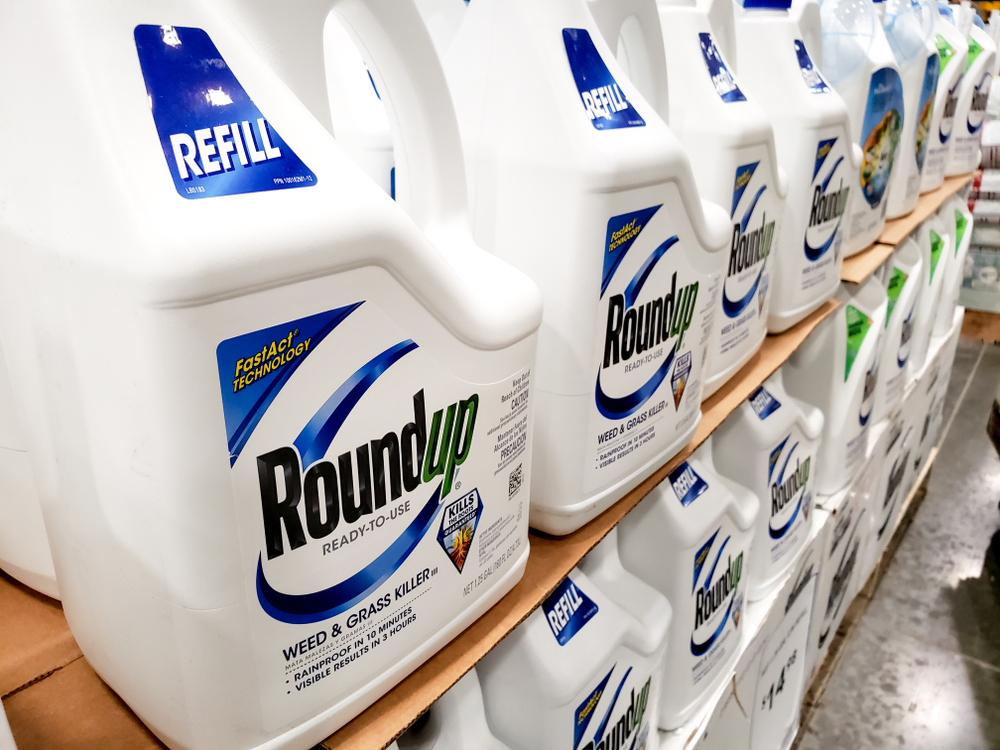
What is Roundup?
Introduced in the United States in 1974, Roundup is a glyphosate-based herbicide frequently used on crops like oat, wheat, beans, and corn. It works by targeting EPSP synthase, which most plants need to survive. After glyphosate is sprayed on plant leaves, they’ll dry up and die within days or weeks. Home gardeners and commercial farmers have relied on the weed killer for decades, which helps explain its global popularity. It’s available in 160 countries, and more than 1.4 billion pounds are applied to crops every year. Roundup is far from the only glyphosate product available for sale, but it is the most prominent on the market. Like most herbicides, Roundup is dangerous if ingested and can cause nasal and throat irritation when the spray is inhaled.
In 2015, the International Agency for Research on Cancer (IARC), an agency of the World Health Organization, decided to classify glyphosate as “probably carcinogenic to humans.” The categorization became controversial after reports revealed that the agency edited out findings that the herbicide may not cause cancer to support its conclusion. Still, independent researchers have reached similar conclusions about glyphosate, with one study suggesting that Roundup exposure increases cancer risk by 41%.
The stance of the U.S. Environmental Protection Agency (EPA) is at odds with these findings. The EPA maintains that glyphosate has no risk to humans when used as intended and even banned California from including cancer warnings on Roundup products. The federal government’s response to Roundup cancer claims is the crux of Bayer’s petition to the U.S. Supreme Court. Edwin Hardeman, a 72-year-old man, alleged that Roundup caused his non-Hodgkin’s lymphoma and sued Monsanto in 2016. A jury awarded him $25 million in damages. Bayer is trying to get the award reversed, arguing that the federal government approved Roundup labels. Given that the EPA publicly stated that a cancer warning on Roundup would be “false and misleading” in 2019, Bayer argues that it’s being held to a stricter standard than it should be.
Hardeman’s lawyers say that the EPA doesn’t account for glyphosate’s carcinogenic effects when combined with other ingredients. While Roundup is mostly glyphosate, it also contains other chemicals. Meanwhile, Bayer has said it’s unreasonable for a company to be held accountable when federal agencies say a product isn’t carcinogenic. Bayer argued that it’s unreasonable that “a company can be severely punished for marketing a product without a cancer warning when the near-universal scientific and regulatory consensus is that the product does not cause cancer, and the responsible federal agency has forbidden such a warning.” The EPA remains firm in its position that glyphosate isn’t carcinogenic for humans.
Roundup and Non-Hodgkin’s Lymphoma
Non-Hodgkin’s lymphoma (NHL) is the seventh most common cancer in the United States. It has more than 60 subtypes and typically develops in lymph nodes or lymphatic tissue. Some frequent symptoms are vague enough that patients may not realize they’re seriously sick. A swollen lymph node in the neck, armpit, and groin is one of the most common first signs. Because these enlarged nodes are often painless, it may not seem alarming. However, an NHL sufferer may soon experience night sweats, unexplained weight loss, loss of appetite, rashes, and an enlarged spleen.
If a doctor suspects non-Hodgkin’s lymphoma, they will refer a patient to a blood cancer specialist to order a lymph node biopsy. Non-Hodgkin’s lymphoma has an overall 73% five-year survival rate, although some subtypes are more aggressive than others. The disease is treated with chemotherapy, immunotherapy, radiation, and stem cell transplants. Demographically, it’s more common in men and white people. Children can develop the disease, but it’s more likely to affect aging people. About 7 in 10 people receiving a non-Hodgkin’s lymphoma diagnosis are older than 50. Other relevant risk factors include autoimmune conditions like psoriasis and Crohn’s disease, certain viral infections, and a weakened immune system.
The link between glyphosate and non-Hodgkin’s lymphoma is still hotly contested in scientific communities. A 2019 meta-analysis of several animal and human studies found compelling evidence that glyphosate-based herbicides increase the risk of non-Hodgkin’s lymphoma. Researchers conducting lab studies have found that glyphosate can cause DNA damage in cells and trigger oxidative stress, which can cause serious health problems and increase the chances of developing cancer.
Even with the clear risk, Roundup is so vital to the agricultural industry that some farmers still proudly use the herbicide. One farmer told the New York Times that Roundup is still a “fabulous tool” regardless of the health concerns. Most public buildings employ groundskeepers and landscapers to help with lawn upkeep, and these workers often use Roundup when spraying weeds. Aside from professional use, the herbicide is popular with home gardeners, especially those with vegetable and herb gardens.
Notable Roundup Lawsuits
Bayer has spent billions of dollars settling Roundup-related litigation, and the suits have been filed over a relatively short period. Here are a few noteworthy lawsuits.
- In August 2018, a jury awarded former school groundskeeper Dewayne Johnson a staggering $289 million in a lawsuit against Monsanto. Johnson was diagnosed with terminal non-Hodgkin’s lymphoma after using Roundup for years. The jury gave $39 million in compensatory damages and $250 million in punitive damages, although he later accepted a reduced $78 million award, which was eventually reduced to $20.5 million. Johnson’s case is notable because it was the first Roundup cancer lawsuit to go to trial.
- In May 2019, a jury awarded $2 billion to a couple who both developed non-Hodgkin’s lymphoma after using Roundup for decades. A judge later reduced Alva and Alberta Pilliod’s award to $86.7 million, saying that the original judgment was excessive and out of step with legal precedent. Monsanto appealed the verdict earlier this year, and the award was upheld.
- In June 2020, Bayer announced a plan to settle most Roundup lawsuits. The company set aside up to $10.9 billion to resolve claims, although Bayer said the payments weren’t an admission of liability or wrongdoing. The company also announced a class-action proposal to set aside $2 billion for future claims. A judge rejected that plan in court, saying it would “accomplish a lot for Monsanto” but less for complainants.
- In October 2021, Bayer won its first Roundup trial. Ezra Clark was four years old when he was diagnosed with Burkitt’s lymphoma, a rare form of non-Hodgkin’s lymphoma. His mother, Destiny Clark, alleged that the boy was exposed to Roundup as she treated weeds at home. A jury decided that Ezra’s cancer couldn’t definitively be linked to glyphosate exposure.
- In December 2021, Bayer won its second trial victory. Donnetta Stephens sued for negligence and for failing to warn consumers about the dangers of Roundup. After using the herbicide for several decades, Stephens was diagnosed with non-Hodgkin’s lymphoma. A jury found that Roundup wasn’t the cause of her cancer.
Supreme Court Weighs in on Roundup Lawsuits
In December, The United States Supreme Court asked President Joe Biden’s administration for its opinion on whether they should hear a landmark product liability case against pharmaceutical giant Bayer. The case before the Supreme Court is Hardeman v. Monsanto Co., filed initially and argued in California. The plaintiff, Edwin Hardeman, believed that Roundup caused his non-Hodgkin’s lymphoma. After a jury trial in California in March 2019, Hardeman was awarded $80 million by jurors. That figure was trimmed to $25 million by the trial judge. A federal court of appeals upheld the $25 million award. Bayer asked the Supreme Court to hear their appeal.
Early in May, President Biden’s administration shared an opinion on whether the U.S. Supreme Court should hear Bayer’s appeal. The administration urged the Supreme Court not to hear an appeal regarding Roundup and its manufacturer Bayer.
The Supreme Court decided to reject two bids from Bayer to stop Roundup lawsuits. The Roundup lawsuits before the Supreme Court alleged that the company failed to warn the public about the health risks associated with the weed killer. The court’s refusal to hear the appeals is a setback for the Roundup manufacturer and a significant victory for those who say they developed cancer after Roundup exposure.
On June 21, 2022, the justices denied Bayer’s Hardeman appeal. The lower court decision of $25 million in damages awarded to Hardeman, a Roundup user who blamed his cancer on the pharmaceutical and chemical giant’s glyphosate-based weedkillers, remains.
On June 27, 2022, the Supreme Court also rejected another Roundup lawsuit that involved an $87 million verdict in favor of Alberta and Alva Pilliod, a couple who both developed non-Hodgkin’s lymphoma after using Roundup for decades.
Roundup plaintiffs see positive outcomes, but chances are that Bayer will continue to appeal Roundup lawsuits in hopes of stopping further litigation. Meanwhile, attorneys are still filing Roundup lawsuits against Bayer on behalf of people affected by glyphosate. Roundup-related claims by people diagnosed with lymphatic cancers after using the weed killer can still seek legal action and receive compensation.
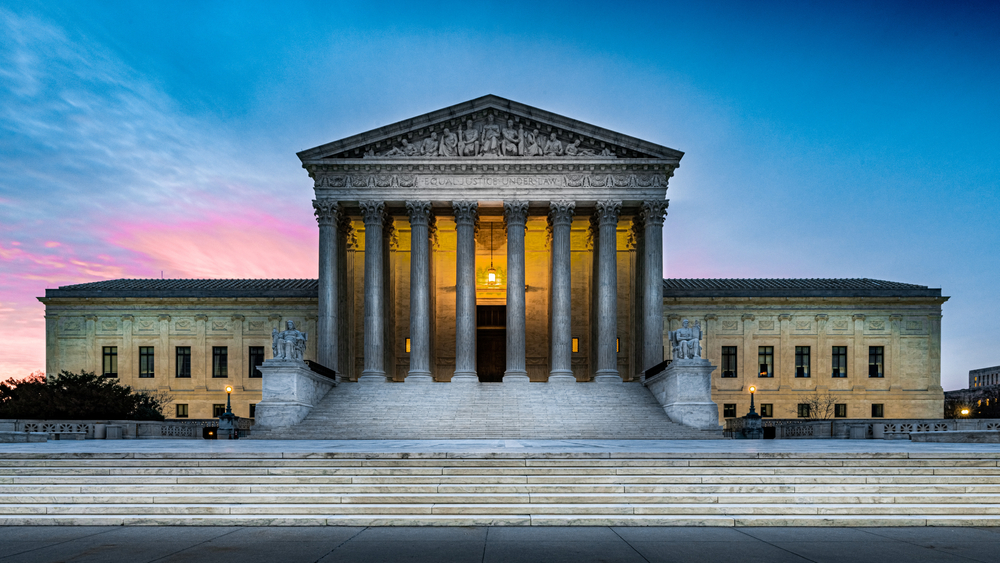
Federal Appeals Court Rejects Preemption in Roundup Lawsuit
Another Roundup legal defeat occurred on July 12, 2022, when the 11th U.S. Circuit Court of Appeals rejected an appeal from a 2017 lawsuit.
In 2017, John Carson sued Bayer claiming his malignant fibrous histiocytoma was caused by 30 years of using Roundup. Carson’s lawsuit claimed defective design, negligence and failure to warn.
Bayer wanted the case thrown out. They argued that Carson’s failure to warn claim was preempted by the federal requirements under the Federal Insecticide, Fungicide, and Rodenticide Act (FIFRA) because the Environmental Protection Agency (EPA) had classified glyphosate as not likely to be carcinogenic to humans and approved the Roundup label. U.S. District Judge R. Stan Baker allowed it to move forward with arguments that Roundup’s design is defective and Bayer was negligent. However, Baker said Bayer had no duty to warn Roundup users about its cancer risk because the EPA had previously approved the product’s label.
As part of a settlement agreement with Bayer, Carson needed to appeal the preemption issue the company won to the U.S. appeals court. Bayer was hoping that if a federal appeals court agreed, it would be more likely for the U.S. Supreme Court to take up the issue and possibly limit Bayer’s liability in other Roundup lawsuits.
The federal appeals court did not agree with the District Court’s ruling on Carson’s failure to warn claim. The court’s opinion stated, “Federal preemption is a bitter pill. We should administer it carefully. And, applying such care to the present case, we hold that John Carson’s Georgia failure to warn claim is not preempted by the federal requirements under the Federal Insecticide, Fungicide, and Rodenticide Act (“FIFRA”) or the Environmental Protection Agency’s (“EPA”) actions pursuant to it.”









